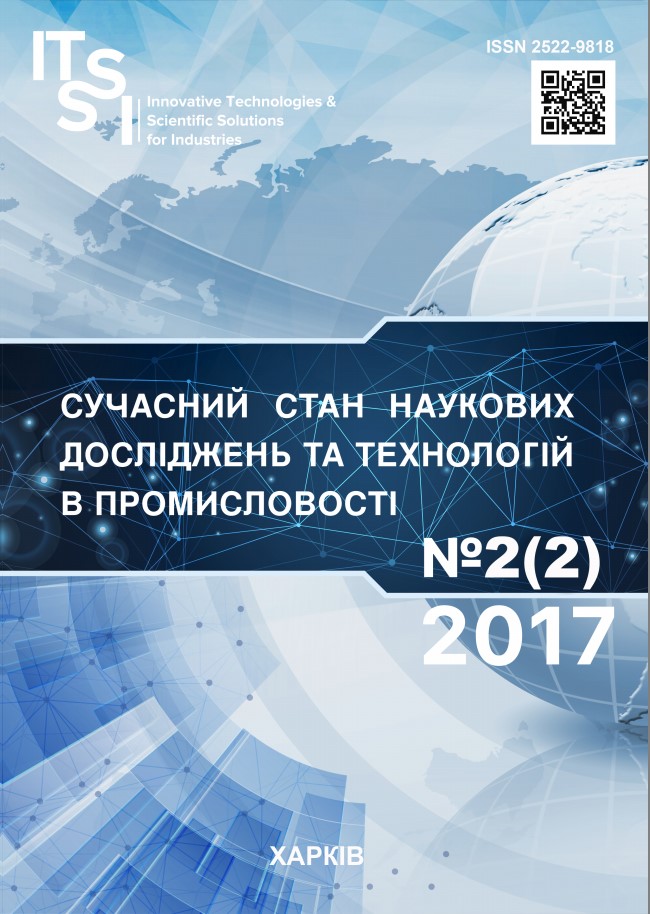RESEARCHING FACTORS OF INNOVATIVE ACTIVITIES OF AGRARIAN BUSINESS OF UKRAINE UNDER GLOBALIZATION OF THE WORLD ECONOMY
DOI:
https://doi.org/10.30837/2522-9818.2017.2.070Keywords:
іnnovative activities, world economy, agroindustrial production, agricultural products, development factors, latent factorsAbstract
Modern processes of reforming the agroindustrial complex of Ukraine, a large part of which belongs to the agrarian sector, under the globalization of world economic processes in the agricultural market require that domestic agroindustrial enterprises improve and rationally manage innovative activities (IА). The effective solution of problems that arise in this context in the rapidly changing economic and social and political environment requires that analytical methods in the management of the enterprises of the agroindustrial complex (AIC) be used on the basis of the tools of economic and mathematical modelling, taking into account characteristics of agrarian production. The main approaches to modelling systems related to IА management are either descriptive or insufficiently formalized, and suggest virtual experimenting with IA management, avoiding the possibility of assessing the impact and consequences of different management options in the long view, minimizing IA risks when making managerial decisions. The subject matter of the article is the tools of economic and mathematical simulation of the development of innovative activities of the domestic agroindustrial complex. The goal is to develop tools for modelling innovative activities of enterprises of the agroindustrial complex of Ukraine in the form of analytical dependencies of impact factors. The objective is to research the dynamics of innovative activities of enterprises of the agroindustrial complex of Ukraine in terms of its components under the globalization of world economic processes in the market of agricultural products. General scientific methods are used, such as system analysis – to determine the peculiarities of development of IА of agroindustrial production in Ukraine, factor analysis – to formalize the cause-and-effect relationships of the investigated factors of AIC enterprises impact on IA. The following results were obtained: on the basis of the analysis of the dynamics of changes in the major indices of domestic agricultural production, the problem aspects were identified and the components of IA of agricultural production were determined, latent factors with prolonged impact on the level of innovative activities of agricultural enterprises of Ukraine were calculated. Conclusions: the calculated latent factors of the impact of AIC enterprises on IА can be efficiently used in foreign economic activities as recommendations for determining the IА strategy of Ukraine in the world agricultural market.
References
Babenko, V. (2014), Management of innovation processes of processing enterprises of agrarian and industrial complex (mathematical modeling and information technologies): monograph [Upravlinnya innovatsiynymy protsesamy pererobnykh pidpryyemstv APK (matematychne modelyuvannya ta informatsiyni tekhnolohiyi): monohrafiya], V. Dokuchaev Kharkiv National Agrarian University, Machulin, 380 p.
Blazhey, A., Driensky, D., Perlaki, I., Ed. Savelyev, A. Ya. (1988), Scientific and Technical Revolution and Engineering Education: [trans. from Slovaks.]. Moscow: High. School. 284 p.
Rogers, E., Agarwal-Rogers, R. (1980), Communication in the organization. Moscow: Economics. 176 p.
Santo, B., Ed. and intro Sazonova, B. B. (1990), Innovation as a mean of economic development: [trans. from hung.]. Moscow: Progress. 296 p.
Twis, B. (1989), Management of scientific and technical innovations: trans. from Englis. Moscow: Economics. 271 p.
Schumpeter, Y. A. (2007), The Theory of Economic Developmen. Moscow: Direct-Media. 400 p.
Baden-Fuller, C., Morgan, M. S. (2010), "Business Models as Models". Long Range Planning. No. 43. Р. 156-171.
Johnson, M. W. (2010), Seizing the white space. Business Model Innovation for growth and renewal. Harvard Business Press: Boston, Massachussetts.
Amit, R., Zott, C. (2012), "Value Through Business Model Innovation". MIT Sloan Management Review. No. 53 (3). P. 41-49.
Teece, D. J. (2010), "Business models, business strategy and innovation". Long Rang Planning. No. 43. P. 172-194.
Strunz Herbert (2011), Tagebuch der Weltwirtschaft, 2000-2010: Kommentare, Kritik, Reflexionen. Frankfurt-Moscow: Lang. 205 p.
World economic outlook, September 2011: slowing growth, rising risks. Intern. Monetary Fund. Washington: IMF. 2011. XVIII. 219 p.
Babenko, V. O. (2016), "Problematic aspects of innovative activity of Ukraine on the world market of agricultural products". Scientific Bulletin of Uzhgorod National University. "International economic relations and world economy". Issue 6. p. 1. P. 26-29.
World economic outlook, April 2015: recovery strengthens, remains uneven. Intern. Monetary Fund. Washington: IMF. 2015. XVI. 216 p.
Science, Technology and Innovation. State Statistics Service of Ukraine. Available at: http://www.ukrstat.gov.ua.
Babenko, V. A. (2017), "Modelling of factors affecting innovational agricultural activity of enterprises AIC in Ukraine". Scientific bulletin of Polissia. No. 1 (9). р. 2. Р. 115-121.
Downloads
How to Cite
Issue
Section
License
Copyright (c) 2018 Vadim Sidorov, Vitalina Babenko, Michael Bondarenko

This work is licensed under a Creative Commons Attribution-NonCommercial-ShareAlike 4.0 International License.
Our journal abides by the Creative Commons copyright rights and permissions for open access journals.
Authors who publish with this journal agree to the following terms:
Authors hold the copyright without restrictions and grant the journal right of first publication with the work simultaneously licensed under a Creative Commons Attribution-NonCommercial-ShareAlike 4.0 International License (CC BY-NC-SA 4.0) that allows others to share the work with an acknowledgment of the work's authorship and initial publication in this journal.
Authors are able to enter into separate, additional contractual arrangements for the non-commercial and non-exclusive distribution of the journal's published version of the work (e.g., post it to an institutional repository or publish it in a book), with an acknowledgment of its initial publication in this journal.
Authors are permitted and encouraged to post their published work online (e.g., in institutional repositories or on their website) as it can lead to productive exchanges, as well as earlier and greater citation of published work.














